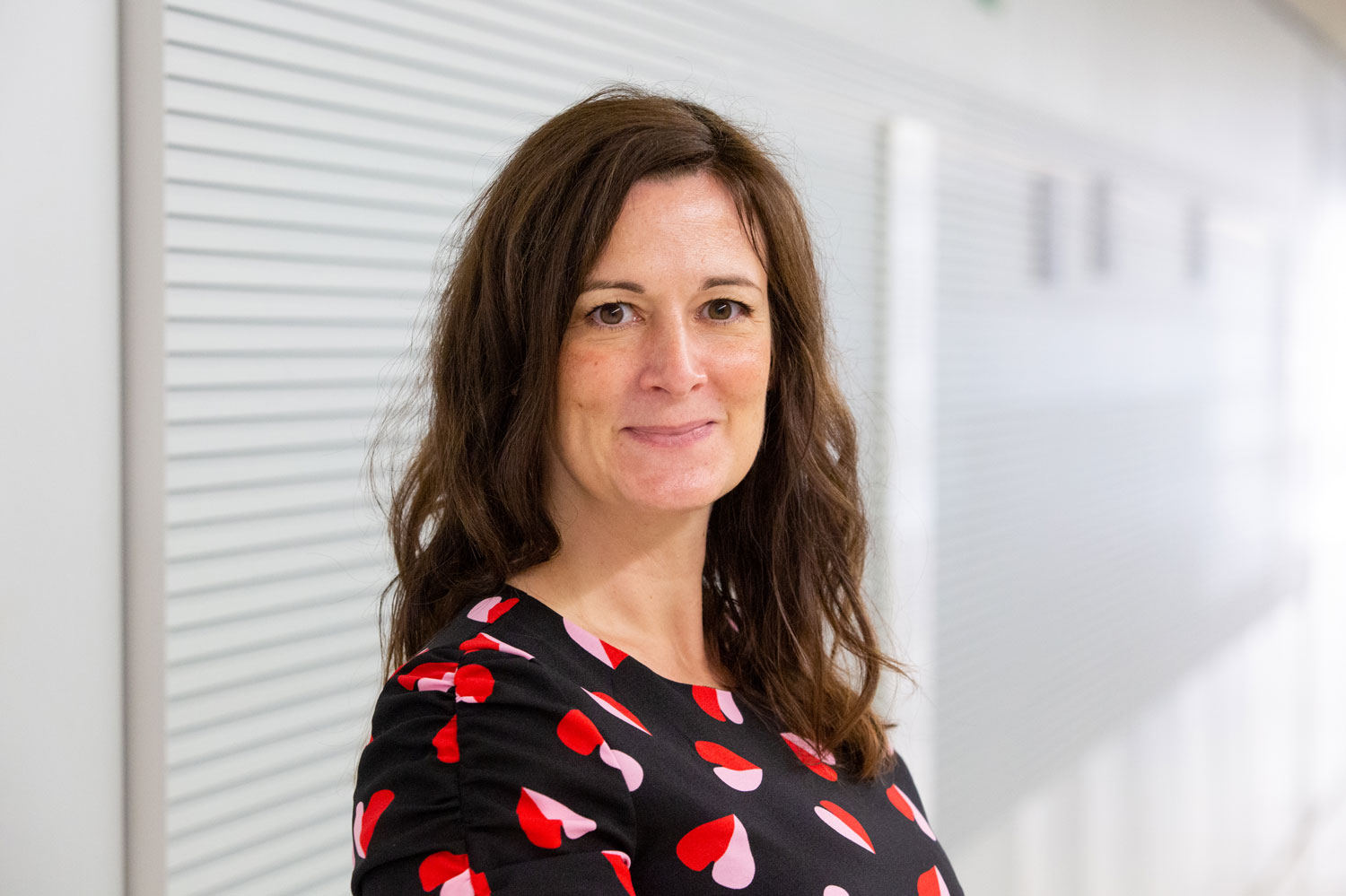"Algorithms are machines for turning normality into a privilege."
- Gemma Galdon (Mataró, Catalan Countries, 1971) is an algorithm auditor and public policy analyst. He has analyzed the impact of technology on legislation, society, surveillance and ethics, and is an expert in smart cities, privacy and security policies, among others. He is director of Eticas Research & Consulting and researcher at the Department of Sociology at the University of Barcelona. At the Euskarabildua Conference we have had an interesting reflection on the awareness of data.

It says that the debate about the use of technologies is built on emotions. Fascination or fear. Do we have to distribute science and science-fiction?
People have ideas about what technology does, and that has very little to do with what technology actually does. And it's understood that the media is continuously giving a distorted, dysfunctional image of technology, serving the press offices. We are in a technologically boring time, but you would never know if you read the press announcing revolutions 4.0 or 5.0.
People think the work is going to be stolen by a robot tomorrow. And the truth is that in everyday life, those of us who work with algorithms or advanced technologies or natural language processing systems, we see very basic technologies. The science we see today has nothing to do with the science fiction that the media is talking about. People are afraid of technologies that don't exist, and that avoids a dignified public debate that allows us to choose what kind of technology we want.
And what are the consequences of the lack of public debate?
Informed public debate is the basis of all democracies. We have the right to decide on things that affect our lives, and algorithms influence our lives. The risk of battered women in the Spanish state is determined by an algorithm that determines whether we are entitled to state benefits, to a mortgage or not, to access public housing or not. These technologies surround us and they're making important decisions.
We should have the right to give our opinion, but in order to give our opinion we have to know what is going on. And distinguish science from science fiction. To know what data you're taking, for what, what possibilities we have to influence them, if there are other alternatives. All of this doesn't get on the table because our way of relating to technology is done from that emotional side: either we're fascinated and invented stories, or we're terrified and we refuse to enter primitivism.
When we talk about technologies, we usually think about machines and robots. But you talk about algorithms and mathematical formulas. How can we make citizenship an audit on such complex issues?
Having a public debate doesn't mean that we all have to be experts, that we all have to study mathematics. The question of food and medicines is the same. When I go shopping I have no doubt that all the things that are in that supermarket have gone through strict safety controls and are therefore edible. When I go to the pharmacy, I'm not a chemist, I don't know what aspirin or ibuprofen carries, and although I read it, I won't understand, but I trust the measures taken by the pharmacist or the doctor and that it will not be harmful to my health.
These Control Processes occur in all areas of our lives except in technological issues. We don't know if they comply with the law or if they can cause more pain. And I don't think it's fair to leave the responsibility for understanding these processes to the public. Nobody's going to ask me to buy an aspirin for a PhD in chemistry. That is why I believe it is not fair to ask the public to know informatics in order to use an application. What is failing is the control processes of these mechanisms, which are easy to audit/supervise, the research of these mathematical processes that are behind the algorithms is relatively simple, it can be done. The transparency of these processes is lacking in order for everyone to have the right to enter them, to question those technologies and to contribute to making this technology better.

You say that this opacity engenders a Big Brother, but petty, evil and insignificant.
The Big Brother, besides being petty and bad, is a banal. Because there is no dictatorial power that wants to see all the people. Silicon Valley's goal is selling, and everything it invents to be able to sell. If addiction to the sale is necessary, it will be the psychologist who undertakes to carry out a study on the influence of dyes used in the application. We have created a panoptic structure but its objective is not social control, the manipulation of citizenship, we have a Big Brother whose sole objective is to sell stupids. That is why it is banal: we have sacrificed our important rights and guarantees so that things can be better sold to us.
But it's also dangerous.
Of course, this infrastructure can have a huge social impact on the bad hands. We are talking about the potential manipulation of elections – although it is not proven, it is true that we sometimes attribute everything to technology. But with such a system, the chances of acting for illegal or illegal purposes are increased. We have a responsibility to take care of the infrastructures we create and to create new infrastructures that are not dangerous.
Left-wing governments often create panoptic structures “to spy on our needs for improvement.” We have to seek that the infrastructures we create do not allow abuse, because now one governs one, but tomorrow who knows? Let us therefore build responsible infrastructures, which do not repent of us.
Edward Snowden says that “because you have nothing to hide is not defending the right to privacy, because you have nothing to say is like not defending freedom of expression.” Is the right to privacy the basis of all other rights?
Many thinkers relate privacy to freedom. I do not foresee developing my personal autonomy without being a different person in different areas. We're not the same people when we're in different contexts of work or family. This possibility of managing and negotiating our identity is a fundamental part that makes us human and makes us free. Digitization consolidates our identity. For the algorithm you are this person, with this level of purchase, with these friends... Our fixed identity is against the freedom that makes us human. In the end, privacy articulates the rest of the rights in relation to the right to be free and to feel free.
He says there are no aspects with a technology control program. In this case, therefore, technologies are subject to the powerful. What measures could be proposed?
Many things can be done since today. For example, national algorithm registers. Declare their use whenever algorithms with social impact are used to allow public entities to know them. Very basic transparency tools, such as those used by institutions in other areas. Measures to protect citizens and especially vulnerable groups; after all, algorithms are machines for turning normality into a privilege. Normality on the Internet is always a middle-aged white man. The rest are excluded by these systems. How do we protect these groups?
There are many laws and processes to protect non-hegemonic collectives, but once again we don't take them to technologies. Those values that we protect offline, we can also protect them online. It is surprising that no party, either on the right or on the left, has tackled the issue from public policies.

What happened with the COVID-Radar app was curious, as Apple and Google have agreed to develop a decentralized system.
The key to the decentralized, distributed and cracked application model to explore interactions between people was not only the difficulty of advanced cryptography, which allows us to explore anonymous interactions, but continuous access to Bluetooth. The applications of any phone run on the surface, the system operativo.El Swiss decentralized model managed to convince
Apple that state applications that complied with the decentralized model allowed access to the operating system, that is, that Bluetooth functioned without turning it on and without lowering the battery level.
Apple has been wanting for years to associate its brand with the defense of privacy, and has won several battles in the courts of justice. It is true that the information you can obtain through the contact search application is obtained by Apple by other means, so you have not given up anything in particular. But what's more interesting is that Google and Apple also came together to allow access to the OS to the Ministry of Health's national applications. That's why it doesn't work with other operating systems.
What is most interesting about this debate is that the only state that claims the need to continue in a centralised model is that of France. France, in the name of its national and technological sovereignty, complained about the imposition of Apple. A town with the best data protection legislation demanded a tech giant the right to monitor its subjects. So it's interesting to have a comprehensive debate about technologies, because not only are there good and bad actors. In this case, Apple was in favour of citizens’ rights and France wanted it to become a tool for violating fundamental rights. This does not mean that they always protect the same, but there are small windows in public and private sectors, to guide best practices.
China is one of the countries that uses these technologies massively to avoid that consumerist view that you spoke about. In particular, social control would be favorable to a collectivist view.
I'm not an expert in China, but there are views that are very interesting. First of all, public investment in technologies in China is huge. Public investment has been multiplying for decades compared to the rest of the world. You're noticing it and you're going to notice it even more. There will be change in who produces the technology and who consumes it. China has already moved away from being a city dedicated exclusively to the production of cheap microchips designed in Silicon Valley. On the other hand, Chinese companies’ barriers to working in the United States by Trump have only increased their resilience. The first system was integrated, Chinese companies had external software or hardware needs. But after Trump closed the doors of the United States, an independent supply and demand has been created. So China is now stronger than it was before the sanctions that were put on it.
And the third question. From the west we like to think that China is a panoptic state, with total social control of the population. But many of the abuses that we denounce there have been for a long time, for example, in the United States, and they denounce them! In China, a digital point system has been put in place to know whether it is a good citizen or not. In the United States they have the Credit Scoring system, which is also private, that analyzes your credits from the past, for example, if you paid and paid well. And without a good Credit Scoring, you can't access many services. They're very egalitarian systems. Some points that you cannot control are related to your past and will condition your future. Denouncing this from the United States is surprising, as despite renaming the process is very similar.
You say that the technological strategies that have been made here are intended to copy Silicon Valley into the start up model looking for a punch, without thinking about the development of the territory. The pandemic has seen more.
Every moment of development in Western history has taken place when public money has been invested. Europe and the United States have been reducing their public investments since the 1960s and China has been putting everything into the technology field since the 1960s. That's what you'll notice: the huge effort of young Chinese people to train in the STEM, sending them to the best universities, etc. Europe and the United States, on the contrary, are increasing university rates, making it difficult to gain general and equitable access to education. Public policies are totally different, and history has shown us that the ability to move forward is that of public investment, private companies will never reach those levels.
Gazteen artean teknologia libreen ezagutza zabaltzeko “Digitalizazio arduratsua” proiektua prestatzen ari dira Baionako Etxepare Lizeoa eta Iametza. Gipuzkoako Foru Aldundiaren “Ideiak2024” aurrekontu parte-hartzaileetara aurkeztu dute egitasmoa. Gaur da
I've been angry with the digital reality that surrounds me in my day to day. The personal abuse of mobiles, Google and the digital deterministic use of children's education, the voluntary submission of public institutions to the tools of big digital corporations, and in general... [+]






















